Lissa Bockrath Shapiro
Heeding her Inner Voice about Art and Life Let's be clear. This is not just a profile of Mark Shapiro's wife. This is the story of Lissa Bockrath, a strong independent woman who just happens to love and be married to Cleveland Indians General Manager, Mark Shapiro. Her story is one of a creative, strong, independent woman. Lissa was born in Warren and raised in Norwalk, Ohio. She knew that the very small town of Norwalk was not the place she would spend her life. "I always felt that wasn't my place to be ultimately." 
Lissa Bockrath Shapiro
at the Greater Cleveland Sports Awards in 2008Lissa has always been very creative; in fact, one of her first memories is being in kindergarten and having the opportunity to paint. "I just couldn't stop because I thought it was so much fun...It turned out terrible because I didn't want to stop and I just kept adding more...it turned into this big brown blob." This was her first experience expressing her creativity and "the thrill of putting paint on paper stuck in [her] mind". She says she was always the one making things out of objects she found laying around; she could see beauty and potential beauty in items her mother would have preferred to throw away. She now hears her son saying the same thing she said to her mother, "But I could use that in a project!" She had boxes of "stuff" which made her "neat freak" mother a little crazy. She now has a box with "stuff" in her kitchen that her son wants to use for his artwork. He has an assortment of sculptures and mixed media pieces that he has created, and no doubt, one day will be showing his contemporary art right next to his mother's. Lissa has both an older sister and a younger sister. Her mother was a nurse and her father, whom Lissa credits with giving her the creativity gene, owns a construction company. She thinks if he had had formal training he could have been an artist, but he was always more of a practical artist. He created furniture when they couldn't afford it and it was beautiful. She says he was always "empowered by whatever needed to be done." She and her father share a power to envision a completed project. He used this skill to design and build their home and to visualize the end result. Her hometown was a more practical environment than Lissa felt she needed. While there she felt the need to be more realistic and down-to-earth. However, none of the standard career choices appealed to her. She considered law or medicine but knew she would not be happy. She tried to get into a typing class at St. Paul High School but couldn't get in because it was full. This turned out to be a blessing for her. There was an opening in the Art Class, but she was not sure she wanted to take it. "I thought it would be like a tease." It was something she wanted, but didn't think she could have. She enrolled anyway and from the very first moment felt like she was home. She decided right then and there she was going to be an artist and throw herself 100% into a future in art. She knew she may not make a dime at it, but somehow she was going to make this work. "It was a clear passion before that, but...that one little class told me, yes, this is what I need to do." 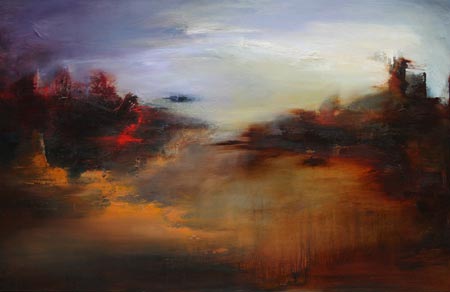
Lissa Bockrath painting - Somewhere in the Middle
The Art teacher was thrilled to have a student so eager to learn and actually asking for more. A lesser teacher wouldn't have taken her off the path, but would have slowed it or delayed it. She considers herself very lucky to have such a wonderful teacher at such a young age. "She really gave me great direction."While most high school and college students were partying and socializing on weekends, Lissa was very much a homebody and spent her weekends painting. That was the only thing she was interested in. Lissa studied all different types of mediums - ceramics, painting, drawing, sculpture - but painting is what she was drawn to and felt happiest doing. It was with this background and commitment that she was able to get a Merit Scholarship and attend the schools she wanted to. She went to the Cleveland Institute of Art and had a terrific experience. She had a lot of freedom in her studies, especially in the fourth and fifth year, which was coupled with direction and training to complete the process. 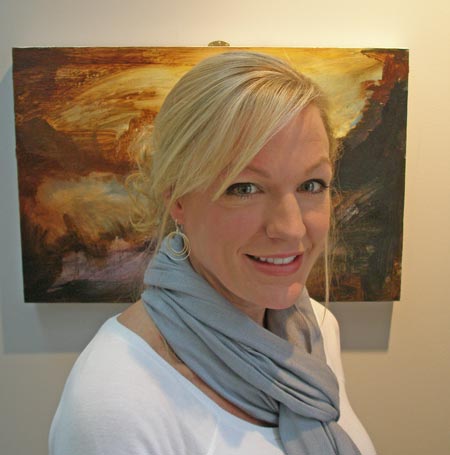
Her parents encouraged her to do whatever she wanted to do; that she could become anything she wanted. "I knew that I excelled in art and I knew that I loved it" and yet she was concerned because no one she knew had ever become an artist and had been able to support themselves in this way.Lissa's family wanted her to follow her passion, but were still concerned about her future. They encouraged her to take courses in education, which she tried, but never liked. She tried to explain her excitement to her family and her hopes of one day opening her own gallery. Parents, almost by definition, worry when a child tells them they want to be an artist and Lissa's parents were no different. 
Lissa Bockrath painting - Stream of Consciousness
Lissa herself is a worrier. She says she worries about everything "but that was just one thing I just kinda knew … I was on the right path and I was going to follow that path and everything was going to come. And that's what I did."She graduated in 1995 and visited local galleries. Lissa decided there just weren't enough galleries in town. She didn't really want to just be part of an existing gallery; especially one that she thought may not be up to the standard that she was reaching for. She took an old warehouse space on 72nd and St. Clair - an old typewriter factory. Other artists occupied parts of the building. She chose a section that didn't even have walls when she chose it. "It was very empowering. I wanted lots of light, big open space and affordable." Accordingly she says she had to learn how to put up walls and fix windows and paint and in turn she was able to barter for rent. She had a small Gallery Opening there, but less than a year later she heard from a friend who mentioned that the Gallery space in Little Italy in the old school house had a space open. She took the new space and for the next 9 years lived above the gallery and showed both her works and other artists' work in the Gallery, the Bockrath Gallery. 
Lissa Bockrath painting - Fleeting Moments Made Permanent
Lissa had no formal training in running a gallery so she visited other galleries she liked and asked all of her questions. She found them to be helpful and informative, but they all cautioned her against doing it. Not too many years later, they all took back their warnings and congratulated her on her fine gallery. "I don't know how, but it always worked. I was always able to pay the bills and then some. It was the right thing." The confidence Lissa had then and continues to have about her art is what she calls "her inner voice." If the inner voice tells her to go for it, she always does. "That was such a clear path for me." She didn't really have a positive influence telling her to go for it except that voice. She also points out that a lot of artists are introverts and enjoy time alone rather than interacting with people. Lissa is the exception. She loves to be with people and discuss the paintings in her gallery and watch people and their reactions as new art is presented to them. This gallery was the opportunity she needed to do that, since in the gallery on St. Clair she was virtually alone the entire time she was there. She averaged about 10 shows a year and one that was just hers. She always found it interesting to hear comments about the work when people didn't know it was her work. "I was able to hear honest feedback...fortunately a lot of it has been positive." Lissa does not show her work until she is comfortable with it. "I don't want it [feedback] to alter my work." 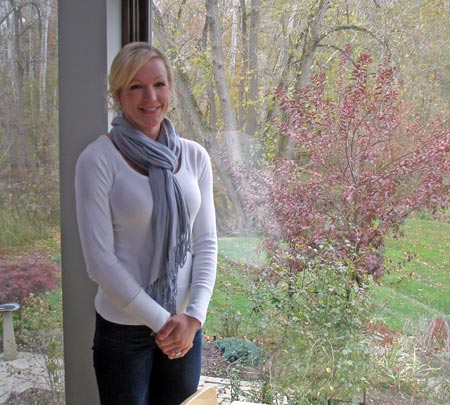
Lissa does very little commission work but rather gets her inspiration from her surroundings. "Throughout my career when I look I can see it kind of progress. When I lived in a very urban area all the pieces were very urban, lots of steel mills and commercial landscapes and then we took a trip to Europe and I see these crowds of people and I get hyper-focused on crowds of people and how they group together and how they interact and that creates a body of work."One body of work at a time is not enough for Lissa. She usually works on 20 - 30 pieces simultaneously and they all get to completion in their own time. She builds her pieces of work in stages. When she first moved into her new home she had no idea what she was going to paint, but knew she "needed" to paint something. She went up to her studio and for the first time just started putting paint to canvas with no real concept in mind. As she finished each one and finally completed the entire project she stepped back and was surprised to see that they were all nature inspired and included water and motion. "As long as I don't interfere too much with the work,it comes out." 
Lissa Bockrath Painting - Atmospheric Encounter
Lissa always knows when the work is done, though some artists have a difficult time walking away. When that final stroke is put on canvas, she "just knows" that it is done.There have been times when she has decided she needs to let a painting go because it is not working for her. She will take a palette knife or paint and just run it over the picture and quite often, she says, the piece comes to life and is at first workable and ultimately a wonderful piece. "I see my life in these paintings. In college when I went through a darker spell, emotionally, the work is terrible...It's interesting to go back and see the pieces I've done...I remember certain events very specifically when I see certain pieces." 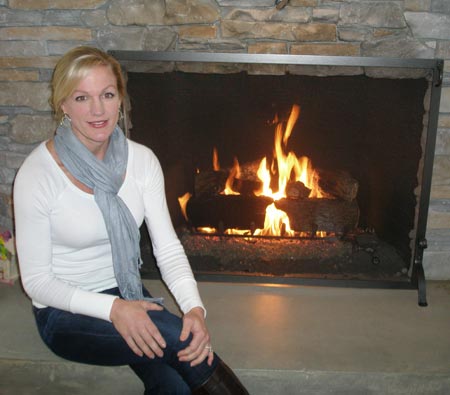 There are a few pieces she does not want to let go of, but in general once a painting is complete she is ready to let it go. She enjoys knowing that someone else is getting pleasure from her work. There are a few pieces she does not want to let go of, but in general once a painting is complete she is ready to let it go. She enjoys knowing that someone else is getting pleasure from her work.Her parents are now very pleased with the way things turned out for her. They still do not completely understand her work, because it is not necessarily their style. They are very proud of her and what she has accomplished. Lissa met her husband Mark Shapiro when he came to her gallery with his mother and sister to buy art for his home. "He was stepping up from his poster collection." She says the second she saw him walk down the long ramp into her space she thought to herself "Who is this guy?" because he had a special bigger-than-life presence. "I felt so at ease with them...we had the best conversations...it was a slow day and we were able to spend a lot of time. There was an immediate connection." He looked at two paintings that he really loved. Lissa often tried to stay anonymous so as not to influence people concerning her pieces. He asked her about the artist, and she answered in the third person. Finally he decided to buy them and unbeknownst to him, she was the artist. When the family left, Mark's sister told him "that's the girl you should marry or you should marry a girl like that. I'm not sure which she said". However, at the time they were both involved in relationships. He asked her out, but she couldn't go. Eventually they were both available and started dating. January 27, 2001 they were married. 
Lissa Bockrath and Mark Shapiro wedding photo at Jacobs Field
In some ways Lissa and Mark's worlds are miles apart. He is, of course, deeply involved in the sports world. Lissa says their worlds don't really clash, they augment each other. She describes him as having a very creative mind; very open minded and very sensitive. Lissa herself played basketball and volleyball but never really had an interest in watching sports. Now that she knows the players and the wives and their kids she has a new interest "And I love the Playoffs!" When it comes to sports talk shows where callers can be heard saying negative and hurtful things about any GM Lissa is not even a little bit affected. "I think if I doubted Mark then it would affect me. Or if I heard something that I felt was true that would affect me. But I believe so much in him that it doesn't matter what people say." 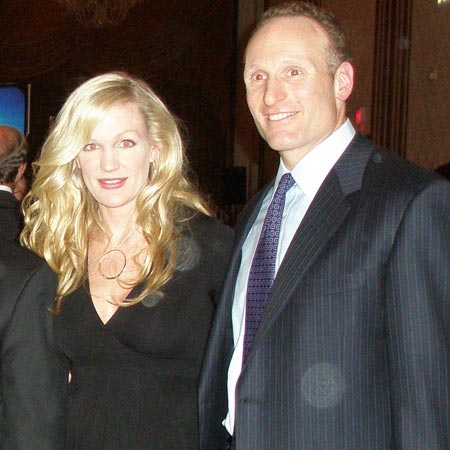
Lissa and Mark Shapiro at the GCSA 2008
"I hear stories about other GM's wives having to pull over to the side of the road and cry and I just never felt that way. I just think no matter what he does or where he is, he is going to excel and I feel like some of the decisions he made along the way were very controversial but I just felt like 'just wait people, it's all going to come together'. With baseball there is only so much you can control."Lissa and Mark's first child was a son, Caden Reid (now 6). Lissa brought him along to the studio. When her daughter Sierra Aris (now 4) was born and the family moved further away, she thought she could not be a "present mom" and run the Gallery. The Bockrath Gallery closed two years ago 
Caden Shapiro
Caden loves his baseball, but is also very creative. He is very compassionate and very soulful. "I think he has an artist's soul. I don't know what he will end up being and I will support whatever it is, but he sure has an artist's soul."Sierra is more literal and more conservative. "She stays in the lines of the coloring book, where Caden has no interest in staying in the lines." 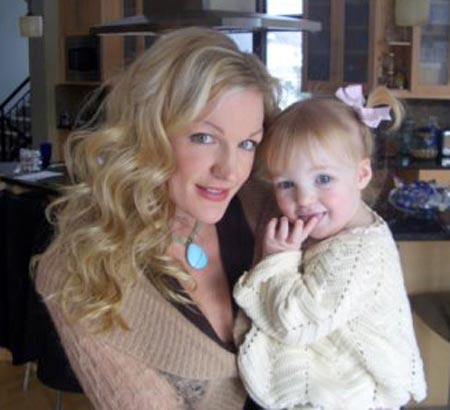
Lissa Bockrath Shapiro with daughter Sierra
Lissa has also shown her work outside of Cleveland and does not feel that being in Cleveland has held her back in any way. She thinks there is a sense of Cleveland in her pictures which she describes as "a quality of light and a certain darkness too. Obviously with the urban pieces...a beauty and yet an edge to it or a darkness to it."One of the things that interests Lissa the most is lighting - in her artwork, on her artwork and in her environment. When she visits other people's homes or work spaces she does not expect to see a mirror of her home, and in fact, loves that people do so many things differently. When it comes to lighting, however, she finds herself mentally critiquing. 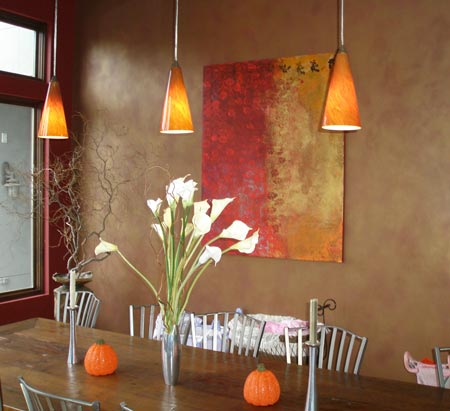
In the Shapiro home"Mark says I am a lighting freak! There are certain restaurants I won't go in because of the lighting. If you name a restaurant I can tell you what the lighting is." Lissa feels she has a role to fill as a mentor. She is always open and eager to guide someone to hear their own inner voice. She has returned to her home town many times to talk to students. "I don't want them to have a false sense of things coming easily, because they don't, but I never want to be the one to discourage…" As far as mass produced art is concerned, Lissa says, "I believe that there is a place for every artist. I don't respond to that type of work [mass produced] but if someone is buying that and putting it in their home and it brings them pleasure, what's wrong with that? I love the idea of having one of a kind pieces. I love the idea of supporting the arts and the creations. So I lean toward one of a kind pieces…" 
Lissa Bockrath painting - Refraction
Lissa hopes to be remembered by her friends as "compassionate, open minded and a good listener. As for the general public she would love to be remembered as an artist who followed her path and followed it openly and honestly."She gets angry at laziness, especially when people do not live up to their potential. As a passionate person, with a German background she says she's "been known to raise her voice a time or two." She is very down-to-earth and honest, even though she is the wife of the Indians General Manager and a renowned fine artist. She thanks God that she grew up in a small town with parents that "wouldn't let you get away with anything." She loved and admired her parents, but also acknowledges that she is not the same kind of parent that her parents were. 
She tries to teach the children all different sides, conservative, liberal, religious and generally other people's insights and diversity. Her environment growing up was German-Catholic and she was not really exposed to other cultures or groups.
There may be another gallery in her future, but not until her children are grown. She has never regretted the decision to close the gallery. She is firmly committed to raising her children. It would be very easy for Lissa to sit back and rest on her laurels. She could hire a nanny and tour the world with her artwork. She is by no means a starving artist - she is successful on her own and married to a successful man. However, these are not the choices she has made. She has chosen instead to be with her children. To have a family. To be mother and wife first. Yet she is not giving up on herself either. She understands that to be the best mother and wife she can be, she must first be the best Lissa she can be.  Her art shows passion and excitement. There is light in her work that makes her pieces very, very special. And there is light in her eyes when she speaks of Mark, Caden and Sierra that makes her, as a person, very special. Her art shows passion and excitement. There is light in her work that makes her pieces very, very special. And there is light in her eyes when she speaks of Mark, Caden and Sierra that makes her, as a person, very special.
 Listen to a brief message from Lissa Bockrath. Listen to a brief message from Lissa Bockrath.
Profiled by Debbie Hanson - 2008

Top of Page
Back to Profiles of Cleveland Women and Girls
| 


